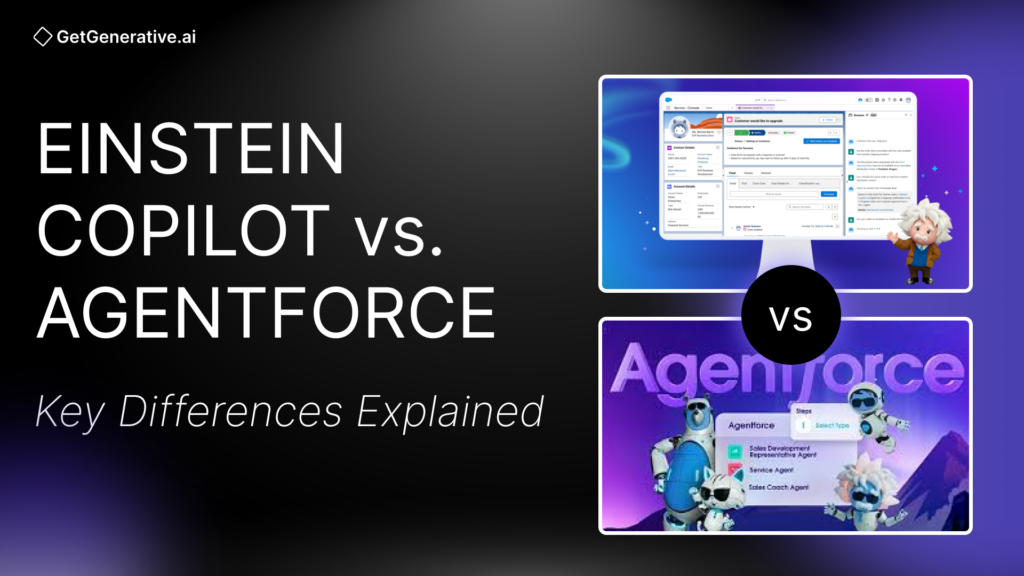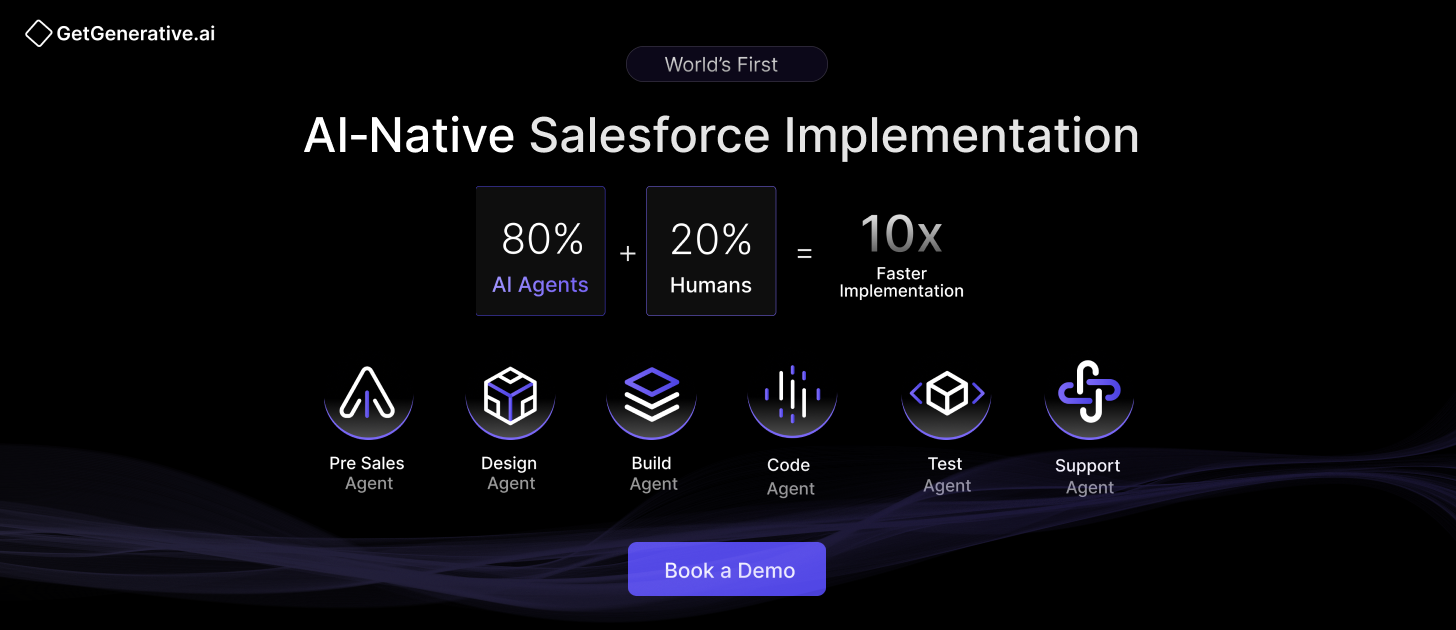Einstein Copilot vs. Agentforce: Key Differences Explained
AI is helping companies enhance efficiency, streamline workflows, and elevate customer experiences. Among Salesforce’s AI innovations, Einstein Copilot and Agentforce stand out as transformative tools. While both cater to improving business operations, they differ significantly in their capabilities, use cases, and approaches to automation.
This blog unravels the distinctions, empowering you to make an informed choice.
What is Einstein Copilot?
Launched as part of the Einstein 1 Platform, Einstein Copilot transformed Salesforce into a smarter CRM by embedding AI-driven insights directly into workflows. It acts like a personal assistant inside Salesforce—helping users act faster, focus on high-value activities, and make decisions based on data instead of guesswork.
Let’s revisit its foundational features:
1. Assisting Users Effectively
Einstein Copilot provides real-time recommendations such as the next-best action in sales, upsell opportunities in service, or potential risks in pipeline management.
Example: A sales rep working in Salesforce gets a Copilot prompt suggesting which account to prioritize today, backed by predictive scoring.
2. Automating Workflows
Copilot can automatically perform repetitive tasks like scheduling meetings, sending follow-up emails, or updating CRM fields.
Example: A customer success manager doesn’t have to manually log meeting notes; Copilot generates and attaches them to the account record.
3. Delivering Predictive Insights
By analyzing historical data, Einstein Copilot provides predictive analytics that empowers businesses to make data-driven decisions, whether it’s forecasting sales or identifying high-value leads.
What is Agentforce?
If Einstein Copilot is an assistant, Agentforce is a workforce. Introduced in 2024, Agentforce moves beyond guided recommendations to deliver fully autonomous AI agents that can execute tasks end-to-end without constant user direction.
1. Fully Autonomous Agents
Agentforce agents aren’t limited to suggesting actions—they can act independently, handling inquiries, resolving cases, and executing workflows.
Example: Instead of recommending a refund process, Agentforce can automatically validate eligibility, initiate the refund, and notify the customer.
2. Integration with Generative AI and LLMs
Agentforce leverages large language models (LLMs) and generative AI to understand complex, natural language queries. It can work across structured and unstructured data sources, such as Salesforce objects, PDFs, call transcripts, and emails.
3. Customization with Agentforce Studio
Businesses can build industry- or company-specific agents through Agentforce Studio, without extensive coding.
Example: A healthcare provider creates a patient intake agent that schedules appointments, checks insurance, and follows HIPAA compliance rules.
4. Advanced Decision-Making with Atlas Reasoning Engine
The Atlas Reasoning Engine empowers Agentforce to handle complex decision-making scenarios, such as risk assessments, customer queries, or operational streamlining. This feature enhances precision and efficiency across various functions.
Also Read – Why Agentforce Makes AI Agents Reliable for Business?
Key Differences Between Einstein Copilot and Agentforce
1. Degree of Autonomy
- Einstein Copilot: Primarily supports users by providing insights and recommendations. It requires user input to execute tasks, making it user-guided.
- Agentforce: Operates independently, handling tasks and making decisions autonomously, reducing the need for constant human oversight.
2. Context Comprehension Capabilities
- Einstein Copilot: Focuses on structured CRM data to deliver insights like sales forecasts or customer behavior patterns.
- Agentforce: Processes both structured and unstructured data (e.g., PDFs, call transcripts) to provide actionable outcomes, thanks to its Atlas Reasoning Engine.
3. Customization and Flexibility
- Einstein Copilot: Offers limited configurability, mainly for CRM-related tasks like sales forecasting or case resolution.
- Agentforce: Allows extensive customization, enabling businesses to design industry-specific agents tailored to diverse use cases.
4. Use of LLMs
- Einstein Copilot: Relies on LLMs for natural language understanding but cannot make autonomous decisions.
- Agentforce: Combines LLMs with agentic AI to execute complex workflows independently.
How Businesses Benefit from Agentforce
Agentforce is designed to cater to diverse industries, offering tailored solutions that address specific challenges:
1. Financial Services
Agentforce excels in automating repetitive tasks like fraud detection, claims processing, and portfolio analysis. By providing real-time insights and proactive client management, it transforms customer interactions in banking and insurance.
2. Healthcare and Life Sciences
In healthcare, Agentforce streamlines patient care by managing scheduling, reminders, and basic inquiries. It ensures compliance with strict data protection laws like HIPAA, offering secure, efficient solutions for providers and patients.
Also Read – Understanding Salesforce’s Einstein Trust Layer
Why Choose Agentforce Over Einstein Copilot?
While Einstein Copilot is ideal for businesses seeking intelligent assistance, Agentforce suits those requiring a higher degree of autonomy and adaptability. Here’s when you should opt for Agentforce:
- Your business handles complex, dynamic tasks that require autonomous decision-making.
- You need customizable agents for specific workflows or industries.
- You aim to reduce manual intervention in customer service, sales, or operations.
Conclusion
Salesforce’s evolution from Einstein Copilot to Agentforce marks a significant milestone in AI innovation. While Copilot paved the way for intelligent assistance, Agentforce pushes the boundaries by introducing autonomous agents capable of transforming business operations. Choosing between the two depends on your organization’s specific needs and goals.
At GetGenerative.ai, we’ve reimagined Salesforce implementation—built from the ground up with AI at the core. This isn’t legacy delivery with AI added on. It’s a faster, smarter, AI-native approach powered by our proprietary platform.
👉 Explore our Salesforce AI consulting services
FAQs
1. What is the primary function of Einstein Copilot?
Einstein Copilot assists users by providing actionable insights, automating workflows, and offering recommendations to enhance productivity.
2. How does Agentforce improve business operations?
Agentforce automates complex tasks, processes unstructured data, and provides customizable AI agents tailored to business needs, reducing manual intervention.
3. Can Einstein Copilot and Agentforce be used together?
Yes, businesses can integrate both tools, leveraging Einstein Copilot for assistance and Agentforce for autonomous operations.
4. What industries benefit most from Agentforce?
Industries like financial services, healthcare, and retail benefit significantly, as Agentforce addresses specific challenges like compliance, customer service, and operational efficiencies.
5. How do I decide between implementing Einstein Copilot or Agentforce?
Evaluate your business needs, focusing on autonomy, customization, and the complexity of tasks. If automation and independence are priorities, Agentforce is the ideal choice.




